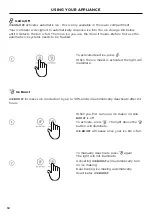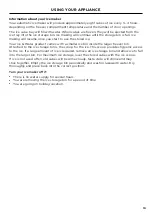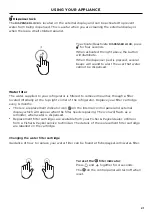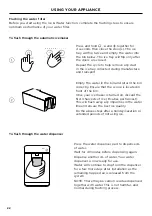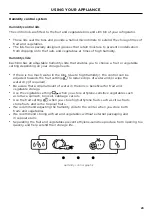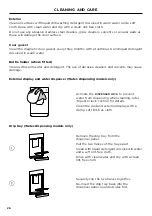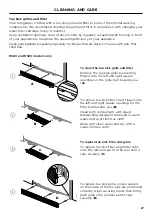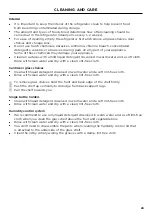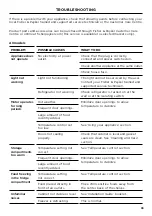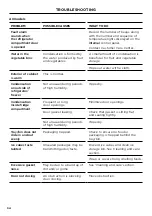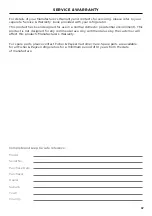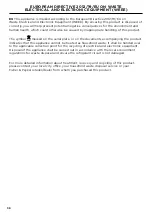
31
For best food care
z
Store only high-quality, fresh food in your appliance.
z
Store perishable foods in the appliance immediately after purchase. Storing at room
temperature increases the rate of deterioration and can allow harmful microbial growth.
z
Foods such as meat, poultry and seafood should be well wrapped or sealed in
suitable packaging to prevent dehydration, color deterioration, loss of flavor, and
transfer of odor.
z
We recommend storing these foods on the bottom shelf of your appliance
or in one of the bins to prevent potential spills and cross-contamination
with other foods.
z
Ensure hot foods and beverages are cooled sufficiently before placing them into
the appliance. Hot items may cause other foods to warm to unsafe temperatures.
It may also cause sealed items to sweat/condensate — which is undesirable.
z
Beverages are best stored standing upright in the door shelves or on the bottle
racks provided.
z
Ensure raw and cooked foods are stored separately to avoid cross-contamination.
z
Consume food items within the recommended storage times. Discard foods that
show sign of spoilage.
z
Keep door openings to a minimum to maintain optimum storage temperatures inside
your appliance.
z
We recommend using ‘Fast Freeze’ when you are adding food items to your freezer, such
as after grocery shopping. This feature will ensure the food is frozen within the shortest
period of time, locking in the freshness and extending the shelf life of your food.
z
Storing at temperatures other than settings recommended may impact the storage life.
Items stored in your refrigerator
z
Dairy items such as butter and cheeses should be stored in the covered door shelf
to minimize any transfer of odor or odor absorption from other foods.
z
Eggs should be stored in their carton to avoid absorption of strong odors through
their porous shell structure.
Items stored in your freezer
z
We recommend cooling carbonated beverages in your freezer only when the ‘Bottle Chill’
function is active.
z
Do not store carbonated drinks without activating this function. Beverages
stored for long periods of time can lead to freezing liquid and the possibility
of bottle/can explosion.
z
Ensure air is removed from packaging to avoid large formation of ice crystals and
prevent freezer burn.
z
To maintain freshness and quality, we recommend defrosting foods in the refrigerator.
These foods should not be in contact with fresh foods. Ensure partially or fully defrosted
foods are never re-frozen – cook immediately.
FOOD CARE


